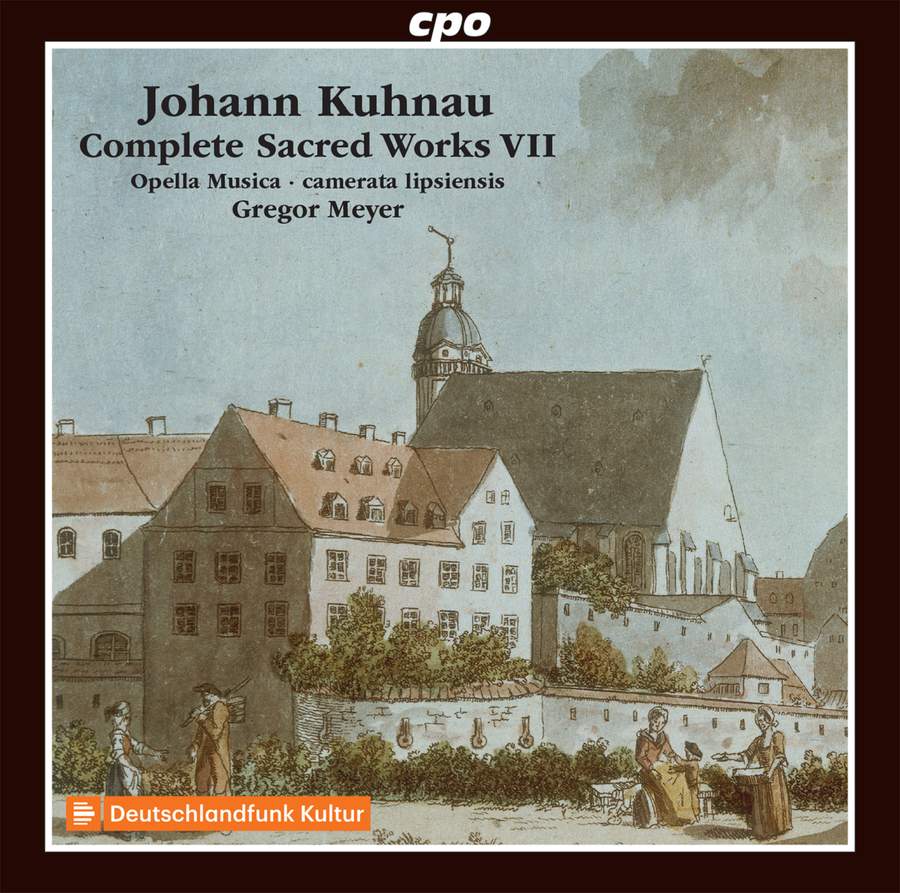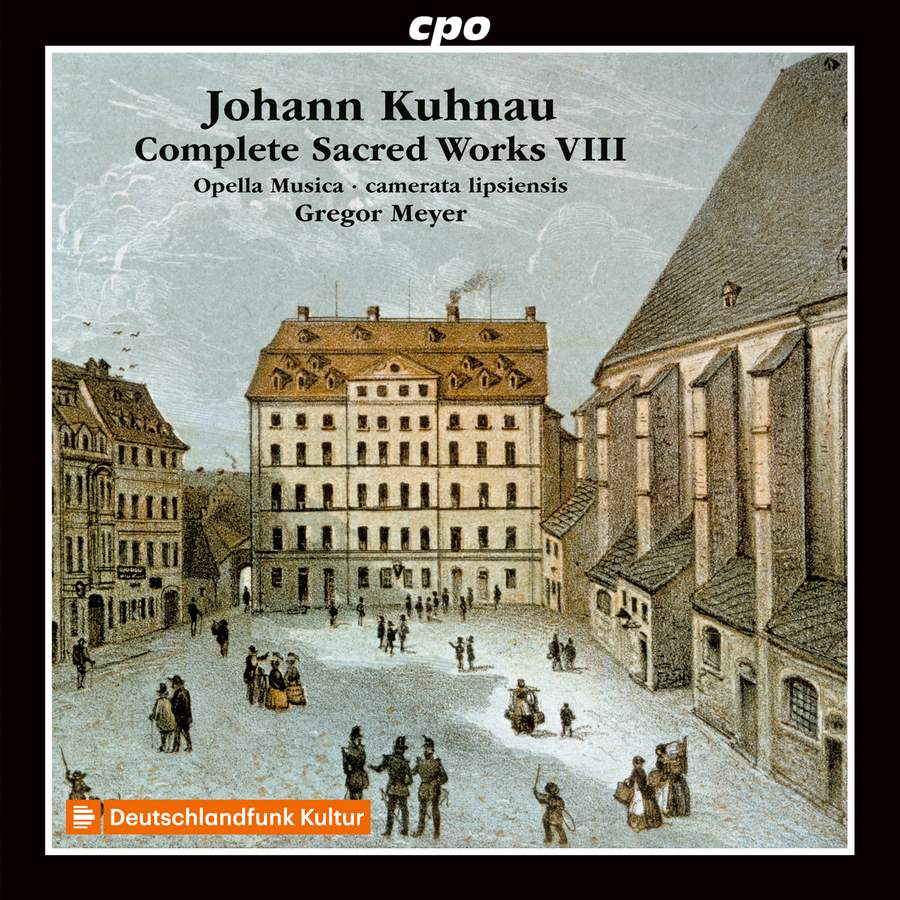KUHNAU Complete Sacred Works, Vols 7 & 8
View record and artist detailsRecord and Artist Details
Genre:
Vocal
Label: CPO
Magazine Review Date: 09/2022
Media Format: CD or Download
Media Runtime: 74
Mastering:
DDD
Catalogue Number: CPO555 399-2

Tracks:
| Composition | Artist Credit |
|---|---|
| Nicht nur allein am frohen Morgen |
Johann Kuhnau, Composer
camerata lipsiensis Gregor Meyer, Conductor Opella Musica |
| Und ob die Feinde Tag und Nacht |
Johann Kuhnau, Composer
camerata lipsiensis Gregor Meyer, Conductor Opella Musica |
| Wie schön leuchtet der Morgenstern |
Johann Kuhnau, Composer
camerata lipsiensis Gregor Meyer, Conductor Opella Musica |
| Uns ist ein Kind geboren |
Johann Kuhnau, Composer
camerata lipsiensis Gregor Meyer, Conductor Opella Musica |
| Das Alte ist vergangen |
Johann Kuhnau, Composer
camerata lipsiensis Gregor Meyer, Conductor Opella Musica |
Genre:
Vocal
Label: CPO
Magazine Review Date: 09/2022
Media Format: CD or Download
Media Runtime: 71
Mastering:
DDD
Catalogue Number: CPO555 460-2

Tracks:
| Composition | Artist Credit |
|---|---|
| Kommt, ihr Musen |
Johann Kuhnau, Composer
camerata lipsiensis Gregor Meyer, Conductor Opella Musica |
| Von Jacobs doppelter Heyrath |
Johann Kuhnau, Composer
camerata lipsiensis Gregor Meyer, Conductor Opella Musica |
| Spirate clementes |
Johann Kuhnau, Composer
camerata lipsiensis Gregor Meyer, Conductor Opella Musica |
| Absurdis Comicis |
Johann Kuhnau, Composer
camerata lipsiensis Gregor Meyer, Conductor Opella Musica |
| Ach Herr, wie sind meiner Feinde so viel |
Johann Kuhnau, Composer
camerata lipsiensis Gregor Meyer, Conductor Opella Musica |
| Ende gut und alles gut |
Johann Kuhnau, Composer
camerata lipsiensis Gregor Meyer, Conductor Opella Musica |
| 3 Arien |
Johann Kuhnau, Composer
camerata lipsiensis Gregor Meyer, Conductor Opella Musica |
Author: David Vickers
Disregarded by posterity as merely Bach’s immediate predecessor in Leipzig, Johann Kuhnau (1660-1722) was appointed organist at the Thomaskirche in 1684 and promoted to cantor in 1701. The holder of a doctorate in law, author of satirical novels, theorist and schoolteacher, his musical pupils included Heinichen, Graupner and Fasch – and the university student Telemann was indebted to him. For over a decade, countertenor David Erler, musicologist Michael Maul and conductor Gregor Meyer have collaborated on the project to edit and record Kuhnau’s complete sacred works; Erler’s scholarly editions are published by Breitkopf & Härtel, and now the CPO recording series is completed in the tercentenary of the composer’s death.
Meyer directs sagaciously from a Silbermann and Hildebrandt organ in the Georgenkirche in Rötha (just south of Leipzig) that was inaugurated by Kuhnau in November 1721. On Vol 7, Camerata Lipsiensis are led expertly by violinist Nadja Zwiener. Opella Musica’s five voices combine adroitly as a compact choir, and each experienced member contributes articulately shaded solo singing. Nicht nur allein am frohen Morgen (second day of Christmas, 1718) opens with a chorus featuring conversational violins echoed by gentle horns and understated timpani; Heidi Maria Taubert sings softly in an aria with warm oboes and bassoon. Kuhnau’s treatment of Wie schön leuchtet der Morgenstern uses pairs of horns and recorders, and five-part strings, with imaginative appeal; its recitatives and arias are sung serenely by tenor Tobias Hunger. Uns ist ein Kind geboren was formerly misattributed to Bach (even catalogued as BWV142), and we cannot be sure that the music is by Kuhnau either, but he is known to have set these words to music for Christmas Day 1720: an aria for concertante violins and bass voice is performed eloquently by Friedemann Klos, an aria for alto voice and solemn recorders is sung sensitively by Erler, and the final choral ‘Alleluja’ has visceral heft. Contrapuntal choruses in the extrovert New Year’s Day cantata Das Alte ist vergangen are replete with flamboyant trumpets and timpani.
Vol 8 is an arcane miscellany. Strophic songs for the play Lustspiel von Jacobs doppelter Heyrath were used at a school production in Zittau in February 1682. Sure-footed performances are amiable and colourful – instrumental ritornellos in the first chorus feature piquant shawms and resonant trombones as well as vivacious strings (led on Vol 8 by Jana Anýžová), and a lovely ensemble of shepherds and shepherdesses has svelte tenderness and harmonic plangency akin to Buxtehude. The chamber cantata Spirate clementes, o Zephyri amici is sung yearningly by two sopranos and bass, accompanied by rapturous violins and tasteful continuo. The dialogue Ach Herr, wie sind meiner Feinde so viel has bold fanfares for trumpets and trombone, and fervent delivery from Klos; in response, an evocative verse on laying down and sleeping is performed sympathetically by Taubert, contoured violins and discreet continuo. The soprano solo cantata Ende gut und alles gut has a sophisticated fusion of sincere moralising and enticing beauty conveyed spellbindingly by Isabel Schicketanz, violinist Anýžová, organist Meyer, cellist Ulrike Becker and lutenist Stefan Maass. This modern-leaning Italianate music, and the significance of the words (the end of everything is good), would have been a fitting end to the journey – but an appendix offers three short strophic arias that were rediscovered recently (their instrumentation includes harp). Indeed, since completing the final instalment, Erler has already found two funeral motets composed by Kuhnau in 1682 for Dresden’s Frauenkirche. At this rate, maybe a ninth volume will become possible.
Discover the world's largest classical music catalogue with Presto Music.

Gramophone Digital Club
- Digital Edition
- Digital Archive
- Reviews Database
- Full website access
From £8.75 / month
Subscribe
Gramophone Full Club
- Print Edition
- Digital Edition
- Digital Archive
- Reviews Database
- Full website access
From £11.00 / month
Subscribe
If you are a library, university or other organisation that would be interested in an institutional subscription to Gramophone please click here for further information.




